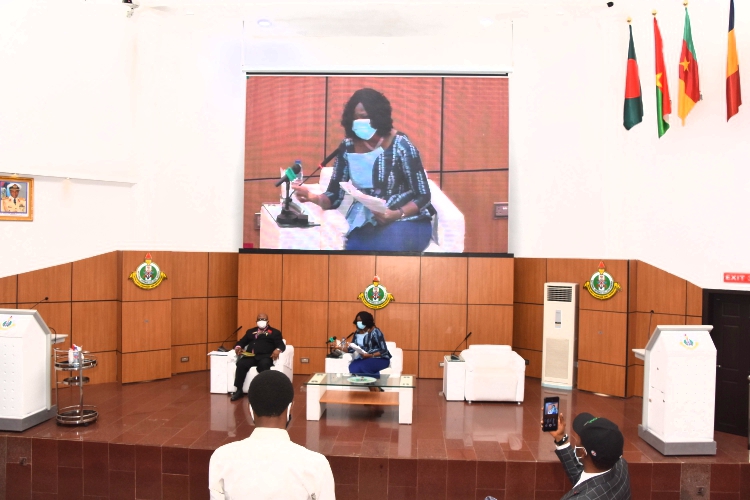1.0 PROTOCOLS – The Commandant National Defence College, Deputy Commandant and Director of Studies, Members of Faculty and Directing Staff, Distinguished Participants, ladies and Gentlemen.
2.0 I am again delighted to be invited to deliver a lecture on Migration, Diaspora and Africa’s Development at the National Defence College (NDC), Abuja to participants of Course 29, on the one-year programme on National Defence and Security, which commenced on 4th September 2020.
Let me start by thanking the Commandant and all staff of the College especially the participants, who I understand include several international officers. I also understand that this lecture is part of the International Affairs and Regional Studies Module, which focuses on international affairs and regional studies. The lecture therefore validates and enriches the importance of knowledge of the international system for officers of your calibre. It will also empower you in dealing with Africa-wide developmental issues after your graduation.
3.0 INTRODUCTION – CONCEPTUAL DISCOURSE
MIGRATION – DIASPORA – AFRICA’S DEVELOPMENT.
Migration is a fundamental part of human nature. People move from one place to another for various reasons including poverty, unemployment, famine, natural disasters, political and religious crises among others. Essentially, migration can be defined as the process of temporary or permanent relocation of a person from his or her place of primary abode to another place, in search of better living, family reunification, further studies or other reasons. Migration is legal when movement of persons from their places of origin across national boundaries is through regulations guiding such movement. It however, becomes illegal or irregular when persons avoid following the due legal procedures of both the country of departure and country of destination.
On the other hand, legal migration can be described as an expression of fundamental rights to mobility. Whereas International law recognizes the rights to leave a country, it cannot support the right to enter another country illegally. An International Committee on the Development of a National Policy on Migration inaugurated on 14th February 2006, and supported by the International Organization for Migration (IOM), an agency of the United Nations (UN) was tasked to draft a comprehensive home-grown policy that addresses the multifaceted issues of migration and create a win-win situation for migrants and countries of origin, transit and destination. In Nigeria, the principles for effective migration policy are focused on the advancement and protection of human rights of Nigerian migrants such as migrant workers within and outside Nigeria.
A Diaspora is somebody who legitimately and legally lives outside his country (country of origin), for more than one year continuously, and has a sustainable means of income and an address in the country of stay (host country). They by implication, are ambassadors-at-large of their country of origin by presence, comportment and character.
The Diaspora phenomena is the product of legitimate migration.
When it comes to Africa’s development, the human aspect is especially at risk when skilled emigration affects significant sectors, i.e., education, health, etc. Although remittances help families, migration outflows can create labour shortages, especially in rural areas.
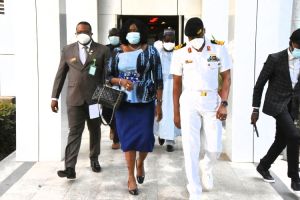 3.1 SCOPE
3.1 SCOPE
The lecture will cover;
- Historical Perspectives of Migration and Diaspora,
- Nature and Patterns of Migration in Africa,
- Drivers of Migration in Africa,
- Diaspora Contributions to Development in Nigeria,
- Managing Diaspora Issues, and
- Leveraging New Technologies to Stem Tide of Migration in Africa.
4.0 Historical Perspectives of Migration and Diaspora
Since the 8th century AD, millions of Nigerians have migrated from Nigeria to other parts of the world. The migrants and their descendants make up the Nigerian Diaspora.
Although the Nigerian migrants were not documented, oral tradition and common beliefs state that the first set of migrants were victims of colonisation and slavery, first to the Arabian world, then to the Western world. According to oral tradition, the scale at which colonisation was practiced in Africa and Nigeria in particular, meant that so many Nigerians before independence became scattered over many foreign nations. (George, 2020, p. 1)
Historians and researchers have long associated Africa’s continued stagnation with slavery, colonialism and subsequent systematic exploitation by the West. However, Africa has the longest history of economic development. Form the early man with hunting and gathering to the advent of agriculture and trading among tribes and nomadic herders, these activities formed the core of economic system of the time, albeit at a micro sale. Despite the wealth of natural resources and independence of African countries, political, cultural and socio-economic struggles persist. In an effort to understand the obstacles impeding African development, two historical events stand out. The impact of slavery and colonialism on the psyche of African people continue to resonate and explain the deep-rooted dilemma which is being experienced today.
While it is true that the above have negatively affected Africa’s development and contributed to some of the issues plaguing Africa including poverty, it is time to move beyond the rhetoric and genuinely examine why the continent remains at the bottom of the barrel. Despite Africa’s wealth, why has the continent remained poor, even after slavery and colonialism. The following factors may explain the reasons why:
- Civil Wars and terrorism.
- Persistent corruption.
- Inadequate Skills and Education.
- Inadequate human capital and extreme poverty.
- Geographical disadvantage e.g., issues with landlocked countries.
- International Aid (leading to loss of respect on the part of donors).
- Unfair trade policies (Western powers tend to control certain sectors, particularly agriculture which the African continent has better advantages).
In order to rise above its ‘poor’ self-inflicted development status, Africa needs to lay more emphasis on shunning corruption, provide basic infrastructure including water, electricity, good road networks, educational facilities, basic health care and security. The wealth of the continent must be well managed in order to facilitate development of Africa. This means that the need for a change of mind-set about the economic, social and psychological negative impact of colonialism on Africa’s development cannot be overemphasized.
4.1 Nature and Patterns of Migration in Africa.
The nature of migration in Africa is dynamic and complex because it is multifaceted and fluid. It continues to respond to and affect changing social, economic, political, and environmental conditions and processes. Some have described Africa as a “continent perpetually on the move”, perhaps more than other regions of the world. Significantly the movements are both intra and inter –continental and often in response to political, economic, religion, security situations and demographic factors.
Note that there is an increase of feminization and commercialization of migration in Africa in contemporary times, often attributable to societal needs. The pattern of Migration in Africa varies from country to country and more women are joining the stream as a survival strategy in the face of daunting socio-economic challenges. Increased numbers of unemployed youth have also embraced migration as they move in search of opportunities and means of livelihood thereby commercializing migration.
4.2 Drivers of Migration in Africa
Factors that lead people to willingly or unwillingly migrate from their roots permanently or temporarily includes:
- Security Factors – Citizens no longer feeling safe e.g., Unrest in the North East of Nigeria, tribal conflict for land, etc.
- Demographic factors – over population, among others.
- Economic Factors: poverty, access to better education, job opportunities, basic healthcare facilities, etc.
- Environmental factors: drought, flooding, natural disasters etc.
- Socio-political factors: Political persecution and conflicts, lack of access to fundamental human rights, discrimination, separation from families due to conflicts, porous borders, religious bigotry, etc.
The interaction between drivers of migration depends on how governments and the international community respond in order to effectively protect migrants, govern migration and harness its benefits. The positive consequences of migration should be exploited for the sustainable development and planning, as majority of migrants and return migrants in Africa are people within the labour force which could form the human capital for African development.
The benefit of migration includes:
- Sustenance of economic growth
- Provision of social safety nets for those who are threatened
- Overcoming recession
- iv) Transfer of manpower and skills
- v) Provision of knowledge and innovation for global growth.
These benefits can only be achieved through legal migration.
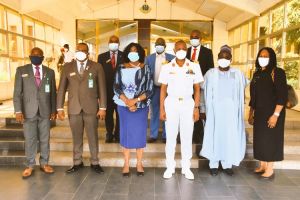 4.3 Diaspora Contributions to Development in Nigeria
4.3 Diaspora Contributions to Development in Nigeria
HE, President Muhammadu Buhari GCFR recognises the role of Nigerians in the Diaspora in terms of their contributions to the Nigerian economy through their:
- Over 25 billion dollars annual home remittances to Nigeria in 2018 through official and non-formal channels.
- Skills contribution to the global economy and to Nigeria through skill transfer.
- Talent and the good image it brings Nigeria in the International arena.
He also has a three-point agenda for the Nigerians in the Diaspora, to include;
- Being the face of Nigeria, and our Ambassador in the Host countries.
- Excelling in whatever endeavours they find themselves doing.
- Not to forget home (Nigeria) by “giving back” in terms of their resources, talents and skills.
4.4 Managing Diaspora Issues
Since the establishment of the Nigerians in Diaspora Commission (NiDCOM) in May 2019, it has dealt with over one hundred complaints/petitions from Nigerians in Diaspora, mainly on issues relating to rights violation and consular services.
The Commission’s role in migration issues, includes:
- Advocating for Nigerians to migrate legally
- Sensitizing Nigerians on obeying the Law and Authority of the host countries.
- Nigerians in Diaspora are our Ambassadors-at-large by their actions, comportment and character and must be encouraged to be so.
- Advocating on welfare issues of the Nigerians in Diaspora.
- Providing cover to Nigerians in Diaspora where acts of aggression by locals/xenophobia are visited on them.
Other activities of the Commission include:
- Development of a National Diaspora Policy, which is awaiting the approval of the Federal Executive Council. Some key components of this policy are:
- The government’s commitment and strategy towards engaging the Diaspora
- Challenges faced in identifying Diaspora needs.
- The provision of a comprehensive and supportive framework for facilitating Diaspora engagement in National development.
- Engaging Diaspora Medical and Charity Missions and the Diaspora Professional Healthcare Initiative (DPHI) in collaboration with the Ministry of Health.
- Diaspora Presidential Town Hall Meetings at the Continents.
- Diaspora Mapping and the Creation of the Diaspora Database.
- The Annual Nigerian Diaspora Investment Summit which mobilizes the Nigerians in Diaspora to invest in the Development of Nigeria.
- The Celebration of the Annual National Diaspora Day on the 25th of July of every year. This is a networking event to celebrate the contributions of Nigerians in the Diaspora to Nigeria’s Development.
- The annual Badagry Festival of Door of Return – connecting with the Historic African Diaspora (HAD).
- Dealing with Petitions/Complaints of Nigerians in the Diaspora.
- Advocacy for Diaspora Voting at the National Assembly. Nigeria must join the league of Countries that will put Diaspora voting in place especially because of the contributions of the Nigerians in Diaspora to the Nigerian economy and for socio-political inclusiveness.
- The establishment of the Nigeria Diaspora Investment Trust Fund (NDITF).
- The establishment of the State Diaspora Focal Point officers and offices.
- The successful return and rehabilitation of Nigerians from the Diaspora, e.g., from Libya, Lebanon and South Africa etc. as a consequence of illegal migration and xenophobic attacks respectively.
- The proposed Diaspora Quarterly Lecture Series.
- Collaboration with other stakeholders to achieve the mandate of the Commission.
It is imperative to note that the Commission’s role in addressing these issues and carrying out these activities are in collaboration with other agencies of government, including:
- Nigerian Missions and embassies abroad
- Ministry of Foreign Affairs (MFA)
- Nigerian Immigration Service (NIS)
- National Drug Law Enforcement Agency (NDLEA)
- National Agency for the Prohibition of Trafficking in Persons (NAPTIP),
- The Nigerian Investment Promotion Council (NIPC).
- Other relevant Ministries, Departments and Agencies (NDA’s).
Also, the Commission works in collaboration with international organisations and non-governmental agencies that deal with migration issues like:
- The United Nations Agency on migration, the International Organisation for Migration (IOM).
- The European Union (EU).
- The International Centre for Migration Policy Development (ICMPD), Vienna, Austria.
As a whole, migration issues (especially as it relates to the diaspora), include and necessitate diplomatic solutions up to the level of the President of the Federal Republic of Nigeria.
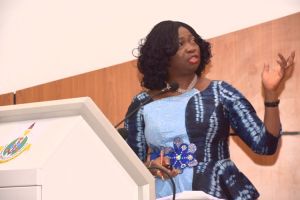 4.5 Leveraging New Technologies to Stem THE Tide of Migration in Africa.
4.5 Leveraging New Technologies to Stem THE Tide of Migration in Africa.
With numerous efforts in place to curtail cross-border movement, this topic highlights how technology in particular helps in reducing this issue.
A main starting point is the need for the development of a Database of citizens in Africa especially of the Diaspora. This is to:
- Enable government acquire adequate information on its citizens.
- Enable border control and migration managers the ability to effectively manage the flow of migration across Africa, requiring the support of high-tech ICT-driven tools and equipment also requiring the combined effort of both African countries and regional organisations i.e., African Union (AU) and regional economic groups like the Economic Community of West African States (ECOWAS) to ensure effectively managed migration.
- Enable the deployment of technology in identifying labour and capacity requirements across the African continent, which can help in driving a controlled migration from one part of Africa to another.
- Enable the identification of job opportunities.
The E – passport harmonization with the National Identity Number (NIN) and Emergency Travel Certificate are platforms already put in place by the Nigerian government, through the Nigerian Immigration Service (NIS).
Other cutting-edge technology such as the Advance Passenger Information, the International Airport Transport Association (IATA), the i-24 Intelligence, etc have reduced the occurrence of security threats on the issue of Visa on Arrival, as these technologies provide platforms whereby intelligence is shared in real-time and online.
In more recent times, we have witnessed the situation with syncing assigned National Identification Numbers (NIN) to mobile telephone numbers, which also goes hand in hand with allotted Bank Verification Numbers (BVN) that can track the flow of remittances through specific banks.
A European Union development fund has financed biometric identity systems in Senegal and Ivory Coast, in some cases aimed at identifying undocumented citizens living in Europe and to organize their return. The system in Ivory Coast in part aims to facilitate the identification of people genuinely of Ivorian nationality and to organize their return more easily.
These systems link names, dates of birth, and other personal information with physical characteristics like fingerprints, facial or iris scans, and have increasingly become vital for law enforcement.
With the current pandemic affecting the world and forcing people to work from their homes, technology has brought to light different means of being in touch virtually with the use of various apps e.g., Zoom for webinars, meetings and personal gatherings.
Apart from leveraging technology, when we look at what Nigerians in the Diaspora have achieved, Nigeria with Her strength in numbers is capable of championing a way of pulling resources together towards the development of the African continent. This can significantly be done through building more on our Human Resources, Industrial Development, etc, by looking at what the Nigerian diaspora is bringing in, and likewise, what the African diaspora brings in.
Nigerians can channel this collaboration between Africans everywhere in the world. This can be done in various ways, i.e., through technology transfer, financial services, etc. so that rather than resorting to seeking funds from other continents, we are able to raise our own capital to develop this continent, as migration is not bad and with hope and a positive vision, we can harness the capabilities of those in the Diaspora for the betterment of our dear country, and the African continent as a whole, allowing for migration to be a win-win if properly harnessed, turning brain drain to brain gain, and then to brain circulation.
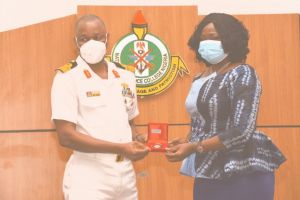 5.0 CONCLUSIONS
5.0 CONCLUSIONS
The issues associated with migration and the diaspora in Africa have several implications on the development of the continent. Some of these have been outlined, in a bid to further the growing discourse on the ‘migrant problem’ around the world in general, and in Africa in particular. I hope that the lecture has provided a good foundation upon which the interactive session will build towards enhancing our individual and collective awareness on contemporary issues in international affairs and regional security.
“Whatever we achieve outside in foreign lands, home is home, and no one else can build and develop our home.”
-Joseph U. Ayalogu,
Former Ambassador of Nigeria to Switzerland, and Perm. Rep.
to the United Nations Office & International Organisations in Geneva. (Apr 2004 – Jan 2007).
6.0 I thank you most sincerely for your attention.
Hon. Abike Dabiri-Erewa.
Chairman/CEO,
Nigerians in Diaspora Commission (NiDCOM),
Abuja.
20th January, 2021.

